This post may contain affiliate links, meaning that if you click and make a purchase, I may earn a commission at no additional cost to you. Read the full disclosure here.
As one of the most visited cities in Europe, Paris attracts a large number of tourists every year, making it an ideal spot for scammers and swindlers to take advantage. One of the best ways we can avoid scams is by being aware of the most common cons so that you can easily recognize them. Here are some common scams that you may encounter in Paris when you are visiting, where you’ll see them, and how to protect yourself and your belongings. Some of these scams are typical of large cities and a few are more unique to Paris.
This post is not meant to scare you or make you fearful of visiting Paris as a tourist. Generally speaking, Paris is a pretty safe city, and I’ve felt comfortable walking around most areas even at night time. However, it is important to be aware of the dangers and situations that can arise.

Shady Taxis
When you arrive in Paris at the airport, this may be the very first scam you come across. Upon exiting the baggage claim area, there are “taxi drivers” waiting to usher you away to their cars. If you plan to hire a taxi, only take a taxi from the official taxi stands. There is clear signage in the airports to let you know where to find them. Additionally, there is often an attendant helping to efficiently direct people from the queue into the waiting cars.
To and from the airports, there is a flat fee according to which bank of Paris you are going to, although some taxi drivers will bank on you not knowing this and try to charge you more. Every taxi is supposed to be equipped with a credit card reader, but sometimes it “doesn’t work” or they “don’t have one.” This means they want to be paid cash so that there’s no record. Before getting into any taxi at the airport, I confirm that I can pay by card and I confirm the price.
If you plan to take a taxi elsewhere in Paris, and not just to or from the airport, know that official Parisian taxis have a Parisian taxi sign and a visible meter. Taxis are heavily regulated in Paris (and throughout France), so read up on the rules.
If you are scammed by a Parisian taxi, you can file a complaint online in English or in French. This form can be used for non-compliance of rates, credit card refusal, etc.
Friendship Bracelets
This scam is quite common in the Montmartre area of Paris. In particular, as you make your way up the steps to the magnificent Sacré-Cœur Basilica, guys waiting on the stairs may try to casually chat with you while braiding a bracelet and tying it to your wrist. These scammers tend to target women more often.
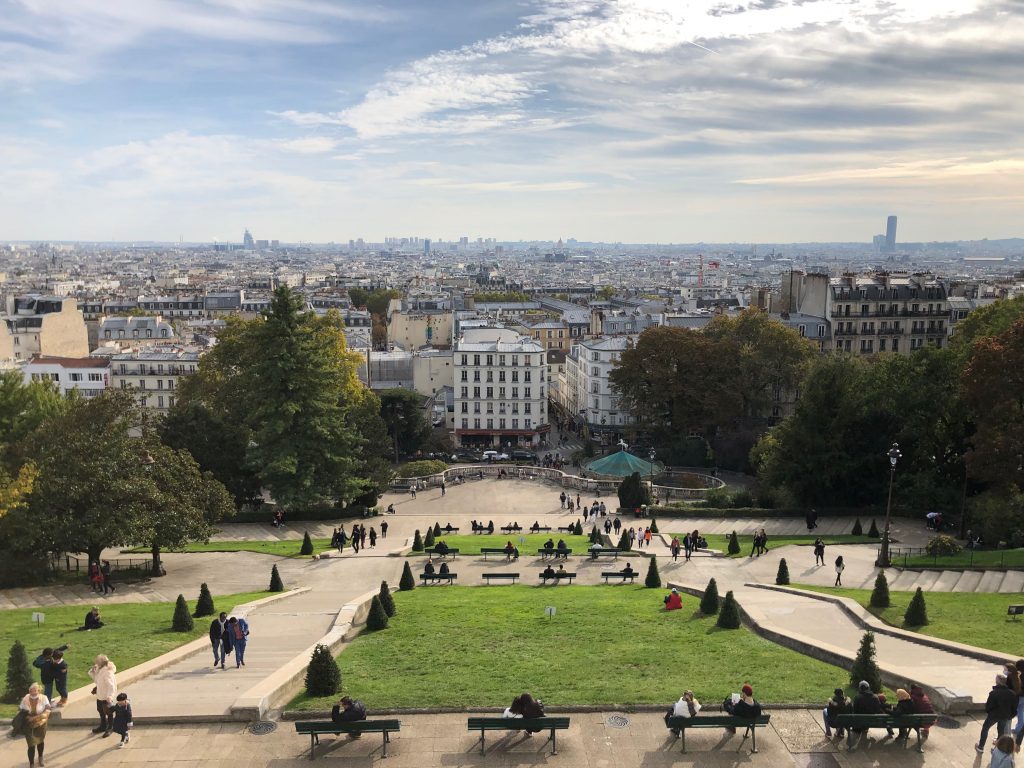
This is one of the worst scams in my opinion because they invade your personal space and can get very close to you. If they succeed in attaching a bracelet or string to your wrist, they will demand money from you. Since they tied it on, it will be hard to remove the bracelet (although usually it releases with a pull of the string). Even at this point, you have no obligation to pay them, but you’d be in an uncomfortable position.
If you want to circumvent this situation altogether, I recommend avoiding the stairs in front of the Sacré-Cœur. Instead, approach the basilica from the side or take the funicular to the summit.
Personally, I haven’t let this scam get in my way. Typically, I give a firm and loud “NON” and/or “Ne me touche pas,” if any of those guys approach me. Putting your hands in your pockets or crossing your arms are also good measures. It’s been my experience that even though they appear pushy, these men back down quickly as they’re seeking people who are unaware.
Free Roses
A man holding a bouquet of roses approaches and extends one to you without saying a word. A rose in the City of Love—how romantic! As a reflex, you’ll be tempted to take it, but if you do, it’ll cost you… or your partner! It’s not a gift. They’re definitely going to want some money for that flower.
Usually, these men make their way around to people sitting outside on a café or restaurant terrace. As you can imagine, they target women and couples in particular. Most notably observed in the evening, this scam is prevalent in the Marais, in the Latin Quarter, and along the Seine but it can happen just about anywhere!
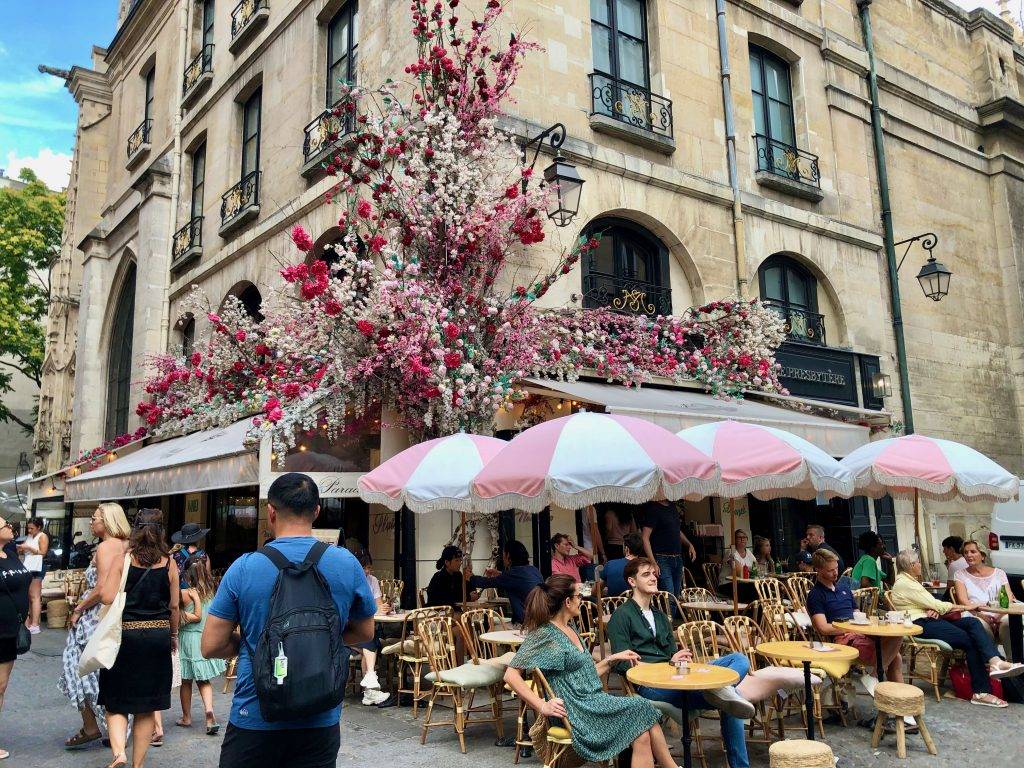
A simple no and/or a wave of your hand will send them on their way. They’re not going to waste any more time on you if the chance of a sale is low!
Dropped Ring Scam
This is the only scam on this roundup list that I have not witnessed firsthand and have only heard about from others. From what I’ve heard, this scam commonly takes place along the banks of the Seine river and near touristy attractions.
As you stroll along, you might notice someone pick up a ring off the ground. They might ask if it’s yours or if you saw where it came from, handing it to you. They might try to convince you that it’s valuable and attempt to get you to pay them for it.
A creative swindle, there are a few variations as to how this scam might play out. The main premise is that there is a “valuable” piece of jewelry that the scammer will try to get you to take. Basically, as we see in this scam and many others, don’t take anything from anyone giving you something on the street!
Signatures for a Cause
This scam is primarily run by women and girls. Holding clipboards, they will try to get you to sign their sheet for some cause or charity that they are supposedly supporting. After you sign your name to the petition, they will ask for your donation. As you’ve likely surmised, the donation will be going directly to their own wallet. In another variation of this scam, one of their accomplices might be pickpocketing you while your attention is on the clipboard.
There are two tactics that I’ve seen employed to initiate an interaction with unsuspecting tourists. The first tactic is that they will ask if you speak English. A second tactic is that they will pretend to be mute and/or deaf and will simply motion you over so that you can read the information on their clipboard. As minor children are often running this scam, you may feel moved to stop and help them out.
I’ve noticed this scam around the Les Halles shopping area, Notre Dame Cathedral, and the Louvre in particular. If you’ve identified this scam, the best solution is to ignore it completely. They will not pursue you.

➡️ Note: In some areas of Paris, there are people promoting causes and asking for donations on the street. This is common with the Red Cross, Amnesty International, and others. People who are working for these organizations will be easily identifiable in their vibrant and clearly marked vests, jackets, t-shirts, etc. These volunteers are legitimate, but personally, when I donate, I prefer to do so online.
Fake Tickets
With the ease of buying entrance and event tickets online and the dematerialization of paper transportation tickets in Paris, this scam is thankfully losing relevancy.
In the past, I’ve seen people try to sell metro tickets in major stations. When the lines for the ticket distribution machines are long, it can be tempting to take advantage of this offer. Very likely, the tickets being sold by scammers are a reduced price fare ticket (such as for a child) or the ticket has already been used and is no longer valid.
Sometimes, around museums and other attractions, you might see people selling entrance tickets. It could be a valid ticket that was purchased at a group rate discount or it could be entirely counterfeit. I wouldn’t recommend taking the risk!
Only buy your tickets from official vendors and websites. If someone approaches you with a good deal, it’s probably not actually a good deal.
Cup & Ball Game
The cup and ball game is a classic trick. There are three cups and one ball. The scammer places the ball under one of the cups and shuffles all three cups around. The object of the game is to indicate under which cup the ball is located. To play the game, you have to make a bet and if you win, your money will be doubled!
It starts off slowly and it seems easy enough… that’s part of the plan. But the scammer is not working alone to pull off this con. Their friends are planted in the crowd to egg you on and encourage higher bets. When you see them win, you’ll be emboldened to try your luck! However, when someone from outside the scammer group makes a bet, the hustler running the game uses a sleight of hand to make sure they lose.
You’ll definitely come across this rigged game near the Eiffel Tower and Trocadéro, around Montmartre, and also on many bridges along the Seine River. Don’t be sucked into playing this game. No offense, but you don’t stand a chance. I do have to admit that I’ve watched from a careful distance though!
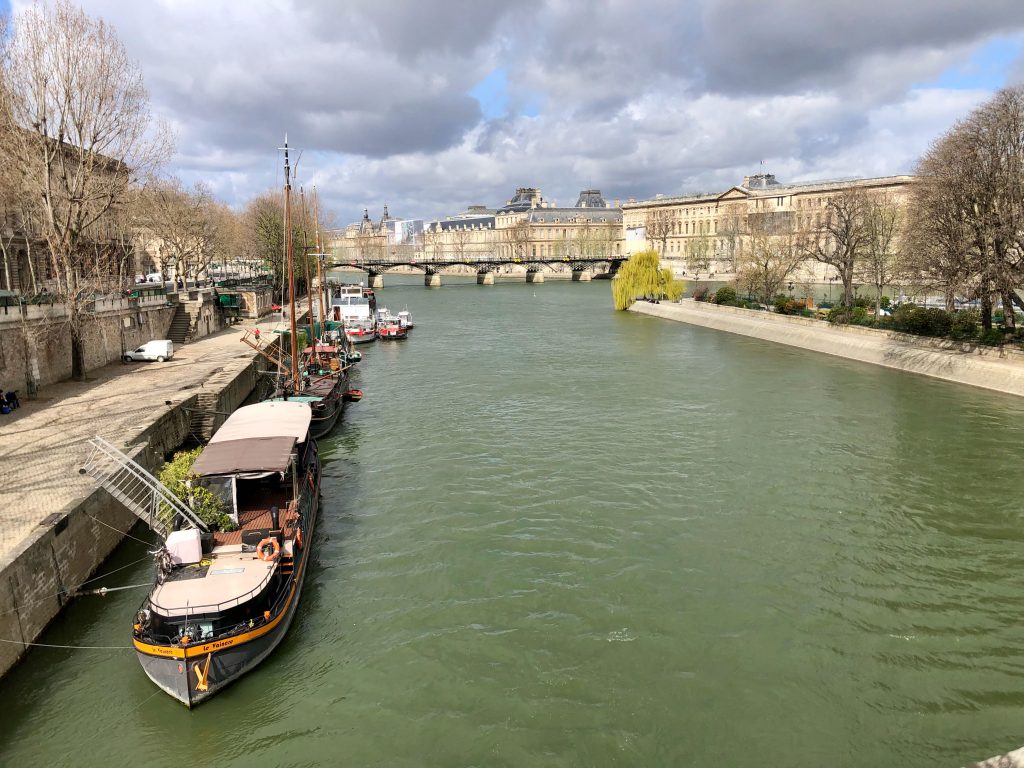
Pickpockets on the Metro
Truth be told, pickpockets are present in many areas of Paris. Perhaps it’s not so much a scam, but it’s definitely worth a mention. The metro, in particular, is favored by pickpockets because after grabbing your valuables, they can easily jump out of the car as the doors are closing. By the time you realize what’s happened, your possessions are gone and it’s too late.
I’ve witnessed pickpockets in action on the Paris metro twice. One time, it was a female passenger standing next to me who alerted me to two men. It’s common for thieves to work in pairs so that one can be a lookout. They were extremely shifty, staring at hand and shoulder bags, and getting unnaturally close to people, particularly women who were focused on their phone screens. If you notice suspicious behavior, it could be a good idea to inform someone nearby in order to enlist their assistance if needed.
Pickpockets are quick and good at what they do. To the best of your ability, be aware of your surroundings and people who get very close to you. Make it a habit to zip your pockets and keep a tight grip on your cell phone if you have it out. On the metro in particular, keep your possessions in front of you.
Read More: 10+ Mistakes Tourists Often Make in Paris
What to Do If You Fall Victim to a Scam
First and foremost, please know that it is not your fault if you fall victim to one of these scams. We can only do so much to protect ourselves. None of us can be vigilant 100% of the time. All it takes is one second of letting your guard down. Scammers are opportunists who thrive on tricking, deceiving, and taking advantage. We are not in the wrong; they are. And it also isn’t helpful or kind to pass judgment or blame on someone who did get taken advantage of. Saying something like, “Well, that’s never happened to me,” doesn’t mean that it never will.
Unfortunately, if you realize that you have been scammed or you discover that your belongings have been stolen, there is not much you can do and this is extremely unfair. In Paris, it is very unlikely that you will get your possessions or money back, although some people do have a mostly empty wallet returned every now and then.
To report a theft, you’ll need to go to the nearest police station (commissariat in French) and lodge a complaint. This is called “porter plainte.” Normally, you can walk into any police station in order to make the report. To save time, you can start the process online.
Related: Do you have the French emergency numbers noted down?
If your identity papers and/or passport were stolen while in Paris, you should contact the nearest embassy or consulate for your country. The US Embassy offers same day processing of emergency US passports on a walk-in basis.
Are you familiar with these scams? Let us know where you’ve seen them happening in Paris in the comments below!


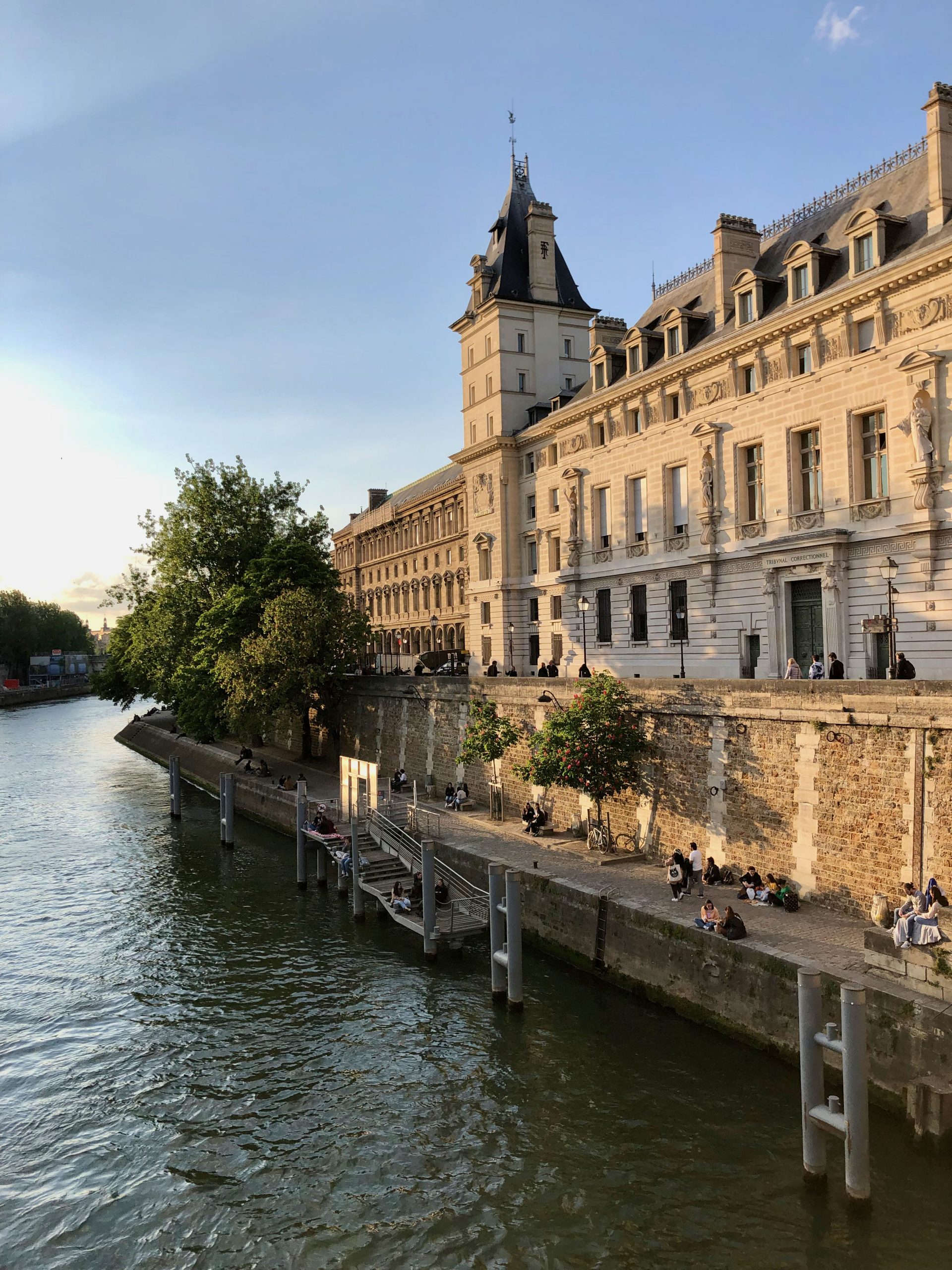
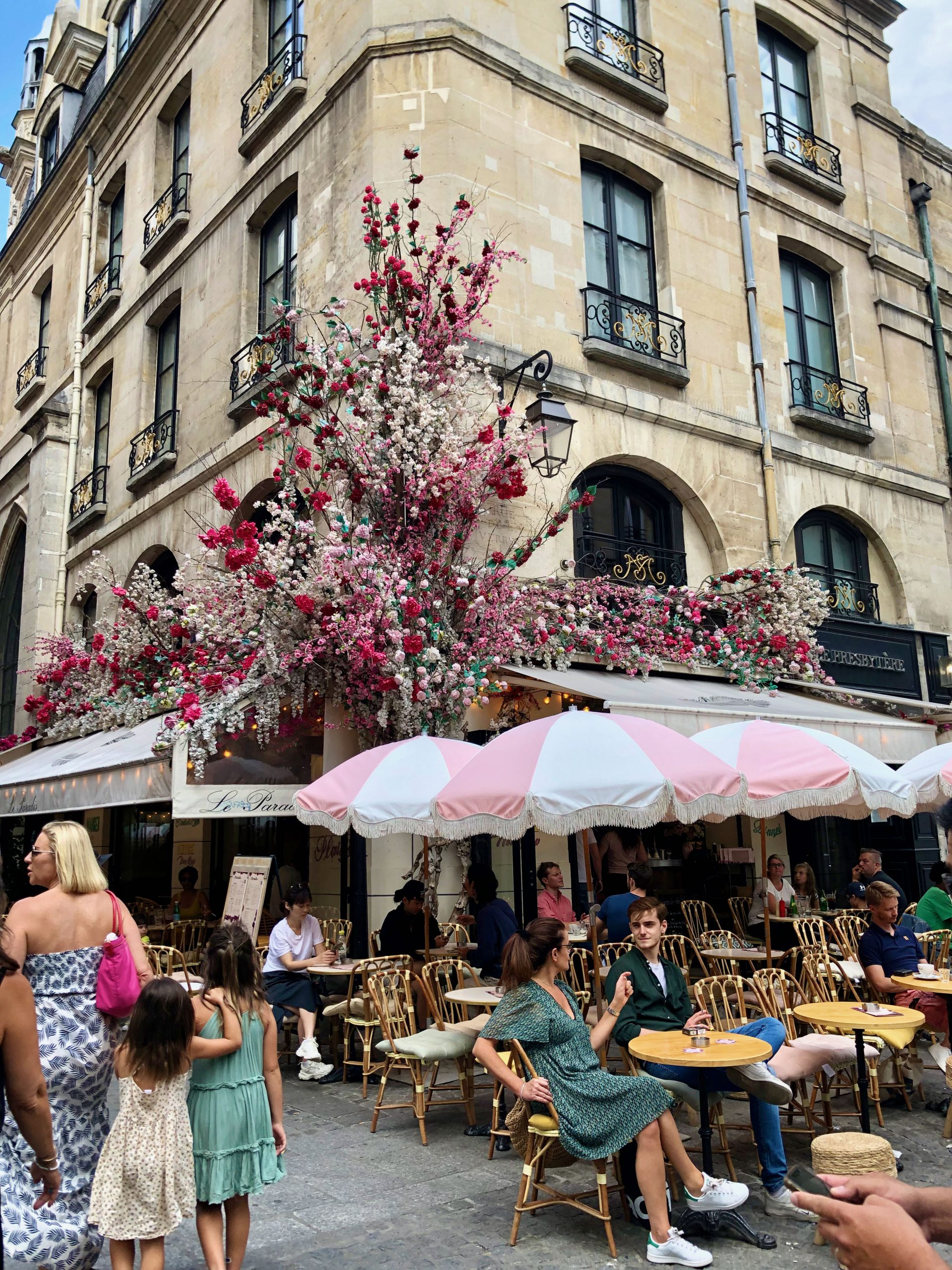

Ah! Have not fallen for any of those scams, perhaps because I am a poorly dressed, portly geezer and could easily pass for a homeless person. I have fallen for another scam, although I wonder if it could really be called a “scam”. A lovely young woman came up to me and asked me if I would like to buy a copy of her collection. “Why not?”, I said. [That, btw, is a new “French” expression that I have heard twice in French movies recently and once on “France Info”]. I was glad to shell out 40 francs (that’s how long ago it was). And every time I see the collection, I wonder if she is the next Baudelaire, and I have a vivid memory of her and the day. Cue the music: https://www.youtube.com/watch?v=vvjhsZYaofk
What a memory!
We had several pickpocket incidents on the metro during our last visit. Just as you described, two men working together who jumped out of the car when I got aggressive. In another incident, we were surrounded by young children to distract us and one of them handed my friend his passport (for a reward?).
Being surrounded by young children in this way sounds like it would be very distracting and disorienting. I haven’t seen that one in action, but I’ve heard of it happening!